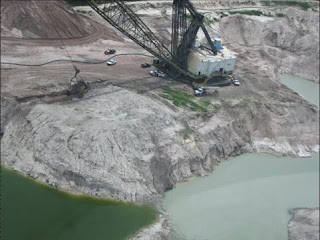Sierra Club Calls Out Army Corps on Mosaic Gypstack Sinkhole
A massive sinkhole that opened up three weeks ago underneath a gypsum stack at a Mosaic phosphate fertilizer plant in Mulberry has dumped at least 215 millions of gallons of contaminated water into the Floridan Aquifer. The Floridan Aquifer provides drinking water for 60 percent of Florida residents.

Phosphate gypstack, Fort Meade. Photo by Harvey Henkelman.
"This new sinkhole demonstrates that the waste disposal methods of Mosaic's fertilizer processing plants and gypstack disposal systems can be dangerous to the environment and the health of our community," said Beverly Griffiths, Chair of Sierra Club Florida's Phosphate Committee.
"The Army Corps of Engineers and the State of Florida need to pause before approving Mosaic's requested permits for new mines in Manatee, Hardee and DeSoto counties," said Griffiths. "The Army Corps needs to add a Supplement to its Areawide Environmental Impact Statement that considers impacts of fertilizer processing plants and gypstacks on our aquifer, drinking water, and natural environment."
The Sierra Club Florida Phosphate Committee has a long history of monitoring Mosaic's impacts on the environment and was an active participant throughout the Area-wide Environmental Impact Statement (AEIS) process, submitting extensive comments at every stage of the process. During that time, Sierra Club Florida called on the Army Corps of Engineers to include the environmental impacts of fertilizer processing plants and gypstacks operated by the phosphate mining industry in the study. The Corps declined to discuss or consider these impacts stating that fertilizer processing was unrelated.